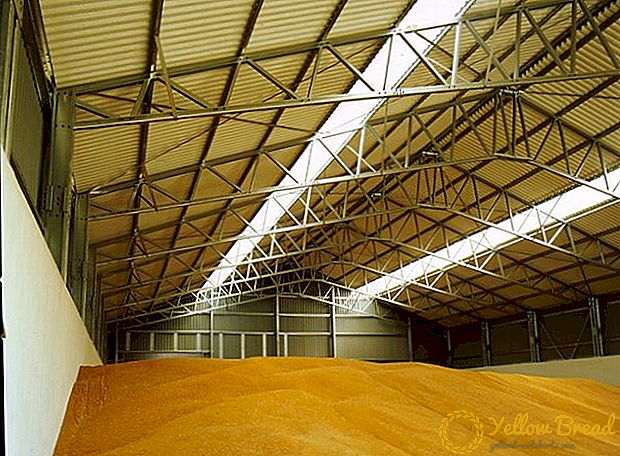 A garden shredder, or a branch crusher, is designed to facilitate the care of the dacha, save time and energy, and also solve the issue of disposing of unnecessary and dry branches after “lightening” crowns and clearing the area. The device has a good demand in the market, so today it can be found in any store of goods for garden and garden. For a middle-income person, a garden shredder is a fairly expensive pleasure, but with small technical skills, the device can be designed with your own hands.
A garden shredder, or a branch crusher, is designed to facilitate the care of the dacha, save time and energy, and also solve the issue of disposing of unnecessary and dry branches after “lightening” crowns and clearing the area. The device has a good demand in the market, so today it can be found in any store of goods for garden and garden. For a middle-income person, a garden shredder is a fairly expensive pleasure, but with small technical skills, the device can be designed with your own hands.
- Appointment of the device in the country
- Design features
- How to make a garden shredder in the country with their own hands (twin-shaft)
- Materials and tools for manufacturing
- Step-by-step instruction
- Disk Grinder DIY
- Collecting construction
Appointment of the device in the country
Garden shredder is used for the following purposes.
- Chopping branches up to 45 mm in diameter. The device crushes branches to fractions of various calibers, depending on the system of knives of a particular device. Basically, from grinding branches more than 15 mm in diameter, a fraction of coarse chips is obtained - about 3 cm.Branches with a diameter of less than 15 mm is better to pass through the shredder.
- Shredding green vegetation through the nozzle-shredder. Using a shredder is very convenient to create a substrate for mulching. The mass is very juicy, suitable density.
Of course, recycled plants can be simply thrown away - after chopping, wood and green vegetation become compact and easily transportable, but many benefits can be derived from these products! Shredded wood and green mass is a valuable organic substrate, which can always be used at any summer cottage. 
- Using chips for the preparation of the substrate. Chopped wood is an important and main component of nutrient compost, which is perfectly suited for sprouting seedlings and seedlings,and is also used as a permanent soil for many indoor plants, such as orchids or violets.
- Use of green mass for mulching. This mulch perfectly fertilizes the soil and protects it from moisture loss and overheating in the summer, but needs periodic replacement.
Design features
The chopper of branches is quite simple to do it yourself, and it consists of:
- metal case;
- working shaft with knives;
- motor, driving mechanism;
- receiving box;
- protective casing.
Work shaft with knives. Knives are one of the most important components of a shredder: the size and shape of the fraction of recycled wood depends on the type of knife. In homemade grinders set the following types of crushing elements:
In homemade grinders set the following types of crushing elements:
- Two-shaft eight-foot design. Consists of two shafts, fixed between two metal plates. Knives are attached to each of the shaft at an angle. Torque from the motor to the shafts is transmitted using a chain or belt that is attached to the gears. The distance between the shafts is adjustable and depends on the size and type of knives, as well as the diameter of the branches.
- Knife-disk design. More simple in design, but less functional: the maximum width of a branch in diameter for a knife-disk construction is 2 cm. Knives with an offset to the center are bolted onto a metal disk. This is done in order to set the direction of the processed material to the center of the device and thereby increase the force of the flywheel.
 Each engine has its advantages and disadvantages; therefore, when designing a home-made chopper for processing branches and grass, it is important to correctly determine the priorities: whether the chopper will be connected to another agricultural machinery; mainly for the processing of which the apparatus will be used; how important is the portability of the device.
Each engine has its advantages and disadvantages; therefore, when designing a home-made chopper for processing branches and grass, it is important to correctly determine the priorities: whether the chopper will be connected to another agricultural machinery; mainly for the processing of which the apparatus will be used; how important is the portability of the device.The gasoline engine will suit you if:
- you are going to recycle large, thick branches over 35 mm in diameter;
- device mobility is important to you;
- You are not going to connect the crusher to other agricultural equipment.
You'd better choose an electric motor if:
- you are going to use the crusher together with other agricultural equipment (combine, tractor);
- you are not satisfied with the need to buy gasoline for the engine;
- The crusher will be used to chop small branches (up to 20 mm) or greens.
How to make a garden shredder in the country with their own hands (twin-shaft)
The two-shaft garden shredder is the most powerful one you can build yourself. A properly designed two-shaft shredder is able to process branches up to 80 mm thick. All materials and parts that are needed for its assembly, you can easily find in any auto parts store or radio market, and the necessary tools will surely be found in each workshop.

Materials and tools for manufacturing
For the manufacture of two-shaft shredder will need:
- engine;
- two metal plates 10 mm thick. Radius - at will;
- two synchronizing gears;
- pulley for transmitting torque;
- pulley on the motor shaft;
- two shaft for mounting knives;
- five bearings with mounts;
- knives;
- profile for the case;
- sheet metal for the manufacture of receiving hopper and protective casing;
- metal pipe for the frame.
Of the tools, one cannot do without a welding machine, wrenches, a perforator, a lathe (for threading and turning parts), and also metal brackets will be useful, but they can be replaced by welding. 
Step-by-step instruction
- Start with welding the case. First of all, we assemble the frame or frame of the future chopper: measure two sections of 40 cm and two sections of 80 cm from the pipe. Next, we weld the short pipes perpendicularly long at the right distance (a drum will be placed between the short pipes). The chopper is a rather heavy unit, its weight will be about 15-20 kg. Therefore, in order not to move the device in the future, moving it from place to place, it is advisable to provide it with wheels.The wheels will be mounted on two racks, which are welded to the frame.
- The next stage is the assembly of the crushing mechanism. First you need to prepare the surface of the shaft to install the knives. To do this, grind the shaft on the machine, forming three flat cuts.

- In the knives, make holes for bolts
- Place the knives on the cuts of the shaft at an angle of 35-45 ° towards the center, mark the mounting points and drill through the marked points of the hole. Then it is necessary to cut the thread inside the holes with a sword.

- The drum body consists of metal walls, four connecting spiers and a protective casing. For the manufacture of the walls of the drum using sheet metal with a thickness of 10 mm. In the walls of the gas burner we make four holes (two in each) for the shaft bearings.
- Weld the frame to the walls of the drum.

- Next, we assemble the crushing mechanism: we mount the bearings on both edges of the shafts and bolt the knives along the cut of the shafts.

- The pulley is attached to the key. For this, a square hole is made in the center of the pulley by a gas torch in the size of the key and the same hole in the shaft, after which both elements are connected by a key.
- Installation of the mechanism on the frame.Install the motor and fasten the pulley on it, then install the drum on the frame and connect the drum pulley and the motor pulley with a belt.
- Receiver design The walls of the receiver are also made of sheet metal. For the receiving compartment, you can use a thinner metal than for the walls of the drum - from 3 to 5 mm thick. Mark and cut the sheet into four equal parts in the shape of a trapezoid.

- Measure 5 cm from the edge of the narrowest side of one of the parts and make a bend.
- If the sheet has a back and front side, then make sure that the bends on the other three parts are made in the opposite direction.
- Then assemble the parts in the form of a box and fix them along the seams with welding or metal brackets. Here is the receiving compartment ready!
- Installing the receiving compartment on the structure is the last thing. The receiver is installed in front of the drum hole and mounted on the facade with the help of bolts, for which holes are pre-drilled in the cuff lapels.

- In conclusion, a protective cover is formed from the sheet metal on the rotating elements of the device in order to avoid possible injury during use.
Disk Grinder DIY
The design of a disk grinder is simpler, rather than two-shaft. Its design is based on the well-known principle of the bakery, only the torque is transmitted by the engine, and not manually. This crushing mechanism consists of a frame, a disk with knives and a motor. This homemade chopper is designed for processing grass and small branches up to 20 mm in diameter.
In order to build a chopper, we need:
- engine;
- pipes for the frame;
- 5 mm thick sheet metal to create a disc;
- Sheet metal up to 5 mm for protective cover and receiver.
Knives for crusher better to buy. Factory knives are made of tool steel grades that will ensure their strength and wear resistance. Knives can also be made by yourself, using a car spring for this, for example, if you have an extra one, of course.But still the factory knife will be a grateful contribution to the future tool.
Collecting construction
- From the pipe, construct a support for the unit. One of the most successful variations of the frameworks for such a crusher is a cube with fastenings for the structure in its upper part and wheels for movement in the lower part.

- Cut a disk with a diameter of 400 mm from a sheet of metal of 5 mm and make a hole in the center for the shaft.
- Next, drill holes in the disk for knives.
- After the knives are fixed to the disk, the disk is mounted on the shaft and the design is attached to the motor.

- The receiving compartment for a disk grinder is made the same as for the two-shaft.

In the manufacture of chips with your own hands you can be useful drawings. Despite the fact that the design is quite visual, with the help of drawings you can calculate all the necessary dimensions and better control the order of assembly. Further examples of drawings for a disk grinder. The whole structure is entirely.
Individual items with a description. 
So, summing up, it would be advisable to name all the pros and cons of the homemade unit.
"Behind":
- home-made shcheporez will cost almost two times cheaper than the purchased one;
- homemade devices are usually very reliable and durable;
- the crusher will need minimal maintenance that you can easily provide yourself;
- an understanding of the apparatus and absolute replaceability of parts will make the mechanism almost eternal.
"Vs":
- availability of free time for the preparation of parts and assembly design;
- the presence or necessity of the development of certain technical skills during the process (turning the details on the machine).
Good luck in your endeavors!






